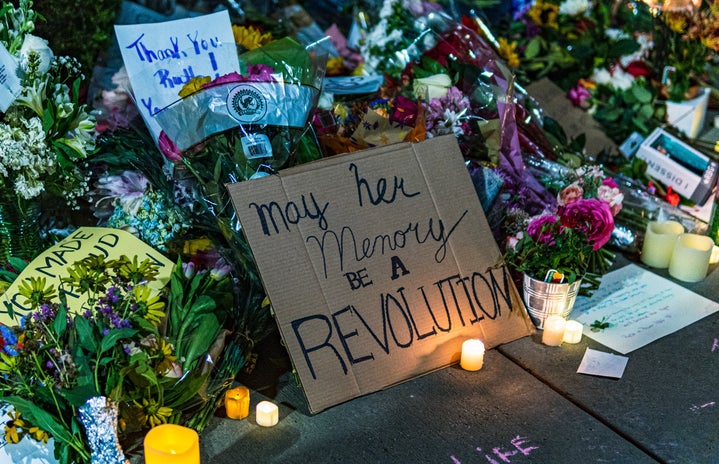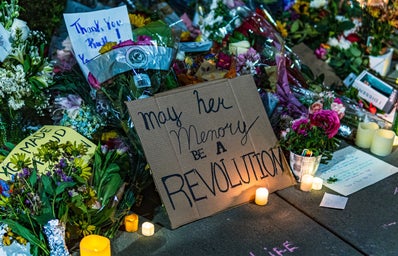Ruth Bader Ginsburg was a pioneer Supreme Court Justice, fighting for the rights of womxn, minorities and the LBGTQ+ community for the years she spent on the bench. Ginsburg sadly passed Sept. 18, 2020 after a long battle with cancer. For her many years fighting against oppressive systems, Ginsburg has received the nickname The Notorious RBG, and that’s exactly what she was—notorious.
Saturday, Sept. 19 the Women’s March held a vigil to honor the icon outside the Supreme Court. The vigil featured several speakers, some that knew Ginsburg and others that have been deeply impacted by her work. I was blown away by the sheer amount of people who attended the memorial, leaving flowers, signs and rocks (a part of Jewish culture) to honor her.
Grief was heavy in the air, but hope quickly took hold, inspiring me and thousands of others to fight for what Ginsburg started.

Massachusetts Sen. Elizabeth Warren delivered a heartfelt speech, leading us in a chant: “I will fight!”. As the crowd yelled this promise, it echoed off the Supreme Court, filling the political hearth of our nation with a promise that we will not allow one woman’s work to go to waste—that we will fight, long and hard. Senator Warren discussed the political precedent set forth by Senate Republicans in 2016 in which they denied President Obama from nominating a new Supreme Court justice in the wake of Justice Scalia’s passing.
Sen. Kristen Gillibrand, Neera Tanden president of Center for American Progress and Becky Pringle president of the National Education Association all also spoke at the vigil. Pringle stood out to me as one of the most impactful speakers of the evening, giving a heartfelt reminder “If women want any rights more than what they’ve got, why don’t they just take them!” Pringle invigorated the crowd by giving thanks to Ginsburg for her unapologetic activism, but also stressed just how important the next few months will be. She championed us to not allow our country to be led by those who do not embrace the three words at the beginning of our Constitution “We the People.” Pringle’s speech embodies what I believe to be Ginsberg’s legacy—it truly is we the people, it is our White House and it is all of our rights at stake.
One of the most important attributes of the event was truly its unity. There were so many times I found myself turning to agree with what those around me had mumbled, complimenting other people’s signs and thanking them for their support. Thousands of us cried together, cheered together and vowed to finish the fight Ginsburg started
Ginsburg served on the Supreme Court for 27 years, quickly becoming the court’s most prominent justice. She was respected by members on both sides of the political spectrum for her tireless fight for social justice. Ginsburg struck down laws that prohibited womxn from pursuing financial autonomy and achieving equality in the workplace. She fervently dissented against the court’s decisions that she disagreed with, modeling the judicial dissent into a chance to persuade Congress and other courts in future rulings. Dissent has become a feature in her legacy, a person only a few feet from me reading, “We too, dissent”.
In the wake of her passing it is up to the President to appoint a new Supreme Court justice, yet only a few weeks away from election day, it seems wrong for the current president to appoint a new justice. In 2016 President Barack Obama was blocked by the Republican Senate from appointing a new Supreme Court Justice when the election was over six months away. Now we are only weeks from an extremely important and divisive election and that same Republican Senate is fighting for President Trump to nominate and pass through a new justice.
Ginsburg stated to her granddaughter as her last request “My most fervent wish is that I will not be replaced until a new president is installed.” There are no specific guidelines in the Constitution that state the President cannot appoint a new Supreme Court justice in an election year, but the Senate did establish this as a precedent in 2016 by preventing President Obama from doing so.

Many Republican senators have already gone back on their stance on appointment in 2016. Majority leader Mitch McConnell stated on February 18, 2016 that “Rarely does a Supreme Court vacancy occur in the final year of a presidential term … Given that we are in the midst of the presidential election process, we believe that the American people should seize the opportunity to weigh in.” Now only a few days after Justice Ginsburg’s death McConnell has announced, “President Trump’s nominee will receive a vote on the floor of the United States Senate.” Now that there is an opportunity for a conservative Supreme Court Justice, McConnell has completely neglected his stance that in an election year the democratic process should impact the nomination.
This hypocrisy was a key point of many speeches at the memorial for Ginsburg. Sen. Warren passionately called out McConnell’s hypocrisy stating, “Mitch McConnell believes that this fight is over… Tonight is the moment to say from the heart, with conviction, to ourselves and to anyone who’s listening: when it comes to the fight to protect a woman’s right to choose, I will fight.”
Attending the memorial was very important to me as a woman, but also something I needed. It’s easy to lose hope in today’s political climate and Ginsburg was a reminder in the victories that we’ve accomplished, losing her was truly heartbreaking, but the legacy that she left behind and now we must uphold will motivate myself and others to continue to fight and win.
Photos: HerCampus Media



